Following the major 1998 coral bleaching event between 2004 and 2011, 291 coral sites from 11 Western Indian Ocean (WIO) countries were surveyed to evaluate regional biogeographic patterns of coral communities along latitudinal gradients and in relation to biogeography and fisheries management. Coral reef abundance, biodiversity, and susceptibility to bleaching were assessed during that period to develop an extensive database on coral reef communities and researchers aimed to evaluate possible impacts such as fishing and fishing closures on reef patterns and status. Patterns show that coral communities are influenced by large-scale interactions between biogeographic factors and temperature abnormalities but not so much by fisheries management. All coral reefs in the WIO are experiencing climate change and coral bleaching since the early 1980s, but at variable rates, timing and scale depending on the geography. The region was characterized by a complexity of a large number of significant interactions among variables tested. The northern Mozambique Channel demonstrated the strongest signs of resilience to climate disturbances.
Author: McClanahan, T.R., M. Atewberhan, E.S. Darling, N.A.J. Graham, and N.A. Muthiga
Year: 2014
View Full Article
PLoS ONE 9(4): e93385. doi: 10.1371/journal.pone.0093385


